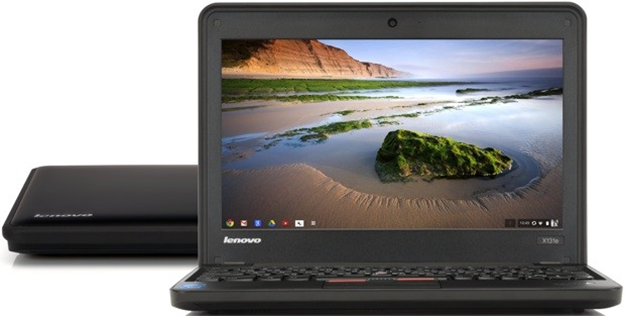Lenovo Joins The Chromebook Gang

Meet the ThinkPad X131e.
When Microsoft introduced Surface, people wondered whether or not other manufacturers will “fight back” and start releasing laptops with other operating systems. With Ubuntu and similar Linux distributions being out of the picture, it looks like at least one more manufacturer has solved the issue and is about to enter the Chromebook market: Lenovo.
Targeting students, Google promises a battery that lasts 6.5 hours, which should be more than enough to get you through the day. The hardware itself is far from impressive, it’s the average 11.6 inch laptop with a 1366 x 768 resolution display, Intel’s Core i5 or i7 processor and few ports here and there.
On a positive note, it’s coming on February in the US and will e available for only $429 + $30 for a one time support cost, whatever that means.
So, would you rather get two Lenovo Chromebooks or one Surface Pro?
About (Author Profile)
Vygantas is a former web designer whose projects are used by companies such as AMD, NVIDIA and departed Westood Studios. Being passionate about software, Vygantas began his journalism career back in 2007 when he founded FavBrowser.com. Having said that, he is also an adrenaline junkie who enjoys good books, fitness activities and Forex trading.




What do you mean by “Ubuntu and similar Linux distributions being out of the picture”?
I think he’s referring to the small OEM support Ubuntu and other Linux distros have compared to Chrome OS. I just think those distros haven’t been given a chance because they don’t have “Google” branded on them.
Dell did sold Ubuntu via their website with nice marketing attached.
And they still do it and lots more (retail sales with proper trainings for sales personnel), but in CHINA :D (and thus mots of US/EU based media outlets think that Dell is out of “classic” Linux business on “classic” PC offerings.
I know Dell support Ubuntu Linux on their machines but there aren’t really any other OEMs that I know that do the same (it’s why I said small support). I could be wrong but I wish Linux was given more of a chance by OEMs.
That is probably true for big OEMs for consumer products. For business RHEL or SuSE are still ad-in options when company want to buy lots of hardware.
Dell support Ubuntu for “just” consumers in China only :(
But nothing is lost. OEMs who support Chromebooks are just shipping Linux too :)
But I wish they would support a variety of distros instead of pushing one that’s backed by Google so much it becomes the only option seen by consumers.
I believe manufacturers tried to push Linux when Vista failed, lots of laptops had Linux installed here but no one bought them, so by saying “out of the picture”, I meant that it’s unlikely that manufacturers will again try to push Linux since it failed the first time.
ChromeOS is derivative of Gentoo O.o
Its LINUX by any conceivably definition :P
And Linux gained 30% of netbook market at its peak. Calling it “no one” is grave error :P Though I do agree that offering with Linux where flawed (purely enterprise OS on purely consumer hardware, ???).
Chromebooks seam to avoid such pitfalls. Hardware is good for software that is running on it, and software is good for hardware.
Anyway, I have no idea why one would chose to have a linux based OS which only has a specific web browser and doesn’t allow you to install anything else, when you can use “Ubuntu and similar linux distributions” which allow you to have the same browser, with the same extensions and bookmarks and still install any other software you want. So, despite the fact that no OEM tried to “push” linux distros, I believe they are still much more in the picture than Chrome “OS”. Actually, this laptop should be quite attractive for people looking for something to run Ubuntu on.
“The hardware itself is far from impressive” “Intel’s Core i5 or i7 processor” Wouldn’t that make this the most powerful Chromebook on the market?
ThinkPads are so out of style. Don’t you agree?